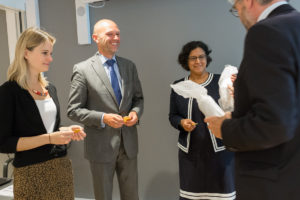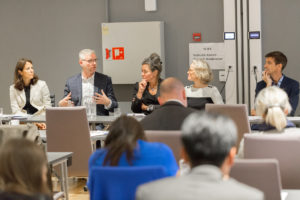How can the recommendations in the OECD document ‘Responsible business conduct for institutional investors‘ be implemented by the finance industry in Norway? This was one of the questions Ola Mestad, Chair of Norway’s NCP, asked the packed hall at the seminar at which the guide was launched. A number of key participants from the Norwegian financial industry took part in the seminar.
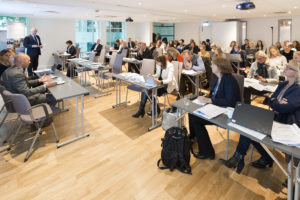
The seminar was a success and had interesting introductory talks by OECD’s Roel Nieuwenkamp and Barbara Bijelic. The latter has written the OECD guidance document in close consultation with a multi-stakeholder advisory group from the financial sector, including leading investment institutions, governments, civil society, international organisations and experts such as investment practitioners.
How are the OECD Guidelines relevant for the financial industry?

Roel Nieuwenkamp pointed out how important it is that 48 states are now legally bound to promoting the OECD Guidelines. This entails that governments have set out clear expectations to businesses to observe the guidelines and carry out risk-based due diligence. The new OECD guidance document specifies that this principle also applies to institutional investors.
Minority shareholders are also expected to incorporate due diligence into their companies’ risk management, to avoid causing adverse impacts to others through the company they invest in. This applies throughout the value chain and includes subsidiaries and not only the initial investment. Nieuwenkamp made reference to the many specific instances handled by NCPs in a number of countries that deals with the role and responsibility of the investor.

Barbara Bijelic underlined that responsible business conduct for investors means that they must have a conscious risk-assessment and prioritise risks on the basis of the degree of severity. The guidance document states that minority shareholders, like other investors, can be directly linked to the companies that cause adverse impacts or violate human rights. Investors are expected to carry out due diligence in relation to portfolios. The investor is not responsible for remedying adverse impacts or human rights violations that arise in a company in the value chain, but are expected to use its leverage to influence the company they have invested in to mitigate the impact.
Human rights – Why should investors care?
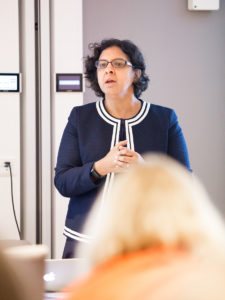
Anita Ramasastry from the UN gave her full support to the OECD guidance document. The UN Guiding Principles on Business and Human Rights (UNGP) is well integrated in the OECD Guidelines, but it also provides a good introduction to the due diligence process.
Ramasastry particularly emphasised the fact that OECD’s new guidance document provides a concrete tool that investors can use to prevent adverse impacts and human rights violations in the companies they invest in.
Support from Finance Norway – Norway’s largest industry organisation
Idar Kreutzer, CEO of Finance Norway, contributed to the seminar with a video message. Finance Norway organises the financial service community in Norway, including some of Norway’s largest institutional investors. Kreutzer welcomed the OECD document, and his key messages were the following:
-
- The promotion of responsible business conduct is vital to a sustainable global economy
- The OECD-document is an important tool in efforts to achieve this
- It can help investors address important issues to understand and mitigate risk and adverse impact caused by companies in which they invest
Kreutzer ended his message saying he is looking forward to seeing the implementation in the financial services industry in Norway of the recommendations from the OECD-document.
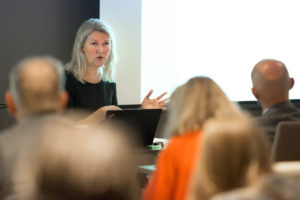
Pia Goyer from Norsif – The Norwegian Forum for Responsible and Sustainable Investmen – gave an introduction to how they work to promote knowledge and share best practices on responsible investments. Norsif is an association of asset owners and asset managers, service providers and industry associations with interest in responsible and sustainable investments. They have more than 40 of the key players in the industry as members. Norsif encourages industry cooperation to enable the Norwegian investment industry to be at the international forefront of responsible and sustainable investments.
Martin Skancke from PRI made reference to how they review annual reports from all their 1,700 investor members. They provide advice and training and the OECD document sets a useful standard to what is expected of investors. PRI also has a collaboration platform for investors who wish to join forces in relation to the companies they invest in.
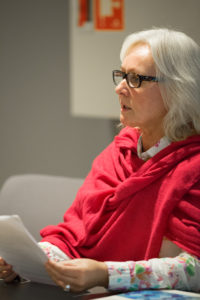
Amnesty Norway’s Beate Ekeløv-Slydal also welcomed the guidance document. She stated that investors are often instrumental in the realisation of big projects that may involve risk of adverse impacts. If investors join forces and present the same set of conditions, they can promote and strengthen the respect for human rights. But if they turn the blind eye to exploitation and violations, Amnesty will consider them as facilitators and complicit in the violations, said Ekeløv-Slydal.
How do investors actually address risk of adverse impact?
NCP Member Frode Elgesem chaired the panel debate “Why and how should investors carry out due diligence”. Representatives from Norges Bank Investment Management (NBIM), KLP (Asset Management of the Municipal Pension fund), Nordea, Principles for Responsible Investment (PRI), FOKUS (Forum for Women and Development) and the Norwegian Forum for Responsible and Sustainable Investment (NORSIF) shared their experience of how they follow up responsible business conduct in practice.
Gunhild Ørstavik from FOKUS has previously been involved in OECD Watch and ForUM, which has submitted a number of complaints to the NCP. Ørstavik emphasised that the guidance document is a good point of departure when companies become involved in high-risk investments, and that it is a step forward that the OECD now has established that investors have a responsibility. She also expressed a clear wish that the investors themselves travelled to the areas where the companies they invest in are based to see the reality first hand.
Skancke from PRI supported Ørstavik’s message, but emphasised the fact that investors often have thousands of companies in their portfolio. The OECD document specifies that investors have a responsibility to map and avoid risk in the companies they invest in. However, it is not possible to actively follow up all the companies in a portfolio. The board plays an important role in establishing a policy and management systems for responsible business conduct.
Monica Mee of Nordea stated that they provide close to 100% active management. We also have separate funds that are intended to be entirely sustainable, which we also point out to the companies. ‘In cases in which we believe the company demonstrates inadequate responsible business conduct, we engage in dialogue with the government, company managements and NGOs. We also travel abroad to visit companies if we have received reports of adverse impacts, sometimes with the media and a video camera in tow.’
Are the companies pulling in the same direction? What instruments does the industry use to establish responsible business conduct in the value chain?
Håvard Gulbrandsen in KLP highlighted the importance of companies pulling in the same direction, and that the new guidance document contributes to strengthening efforts. ‘However, when the risk is revealed, it is important to engage with the board. We deal directly with the board and put pressure on them.’
NBIM’s newly appointed Global Head of Ownership Strategies, Carine Smith Ihenacho, described the various instruments and means the bank uses for responsible business conduct, such as expectation documents, voting and direct contact with selected companies.
NCP Norway would like to thank all the participants for their engagement. We look forward to continuing our cooperation!
A special thank you to Finance Norway and Norsif for their cooperation on the seminar.
Here you can find the pogram.
OECDs page on responsible business conduct in the finance sector:
